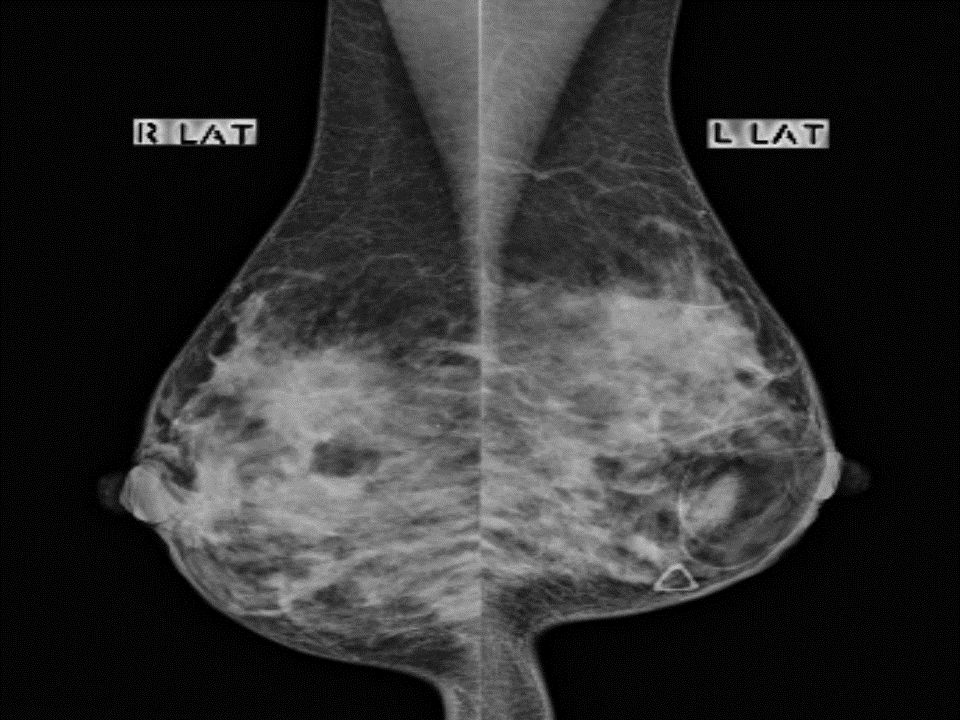Breast lumps other imaging findings
|
Breast lumps Microchapters |
|
Diagnosis |
|---|
|
Treatment |
|
Case Studies |
|
Breast lumps other imaging findings On the Web |
|
American Roentgen Ray Society Images of Breast lumps other imaging findings |
|
Risk calculators and risk factors for Breast lumps other imaging findings |
Editor-In-Chief: C. Michael Gibson, M.S., M.D. [1]; Associate Editor(s)-in-Chief: Shadan Mehraban, M.D.[2]
Overview
Mammography is considered as the first and mainstay for evaluation of palpable masses in women over the age of 40 years. Diagnostic mammogram contains particular views by focal compression of specific part of breast tissue.There is standard method for reporting mammographic findings which is called breast imaging reporting and database system (BI-RADS) which is classified into 7 categories.
Other Imaging Findings
Mammography
- Mammography is considered as the first and mainstay for evaluation of palpable masses in women over the age of 40 years.[1][2]
- Diagnostic mammogram contains particular views by focal compression of specific part of breast tissue.[3]
- Indication of diagnostic mammography:
- Breast symptoms such as palpable masses
- Positive history of breast cancer in past 5 years
- Required additional imaging due to abnormal screening mammogram including (calcification, masses, architectural distortion, asymmetries)
- There is standard method for reporting mammographic findings which is called breast imaging reporting and database system (BI-RADS).[3]
| Category | Assessment | Follow-up |
|---|---|---|
| 0 | Required additional imaging evaluation | Additional imaging findings are required to classify in specific category |
| 1 | Negetive | Annual screening mammograms (age > 40 years) |
| 2 | Benign | Annual screening mammograms (age > 40 years) |
| 3 | Probably benign | Every 6 months follow-up (risk of malignancy < 2%) |
| 4 | Suspicious abnormality | Biopsy should be considered (2% - 95% risk of malignancy) |
| 5 | High suggestive of malignancy | Biopsy is required (> 95% chance of malignancy) |
| 6 | Known cancer | Biopsy is required to prove malignancy |
- Normal mammographic features regarding to palpable mass do not rule out malignancy.Therefore, further ultrasound is needed to be performed.[4]
- Only 57% of women with palpable breast lumps and normal mammographic features received further evaluation.[5]
- Mammographic finding in favor of calcified fibroadenoma, oil cyst, galactocele, hamartoma, lipoma, lymph node, and fatty tissue in specific breast areas do not need any further evaluation.
- However, probably benign and suspicious features are required further evaluation ultrasound.[6]
 |
 |
 |
References
- ↑ Smetherman DH (2013). "Screening, imaging, and image-guided biopsy techniques for breast cancer". Surg Clin North Am. 93 (2): 309–27. doi:10.1016/j.suc.2013.01.004. PMID 23464688.
- ↑ Lehman CD, Lee AY, Lee CI (2014). "Imaging management of palpable breast abnormalities". AJR Am J Roentgenol. 203 (5): 1142–53. doi:10.2214/AJR.14.12725. PMID 25341156.
- ↑ 3.0 3.1 Shikhman R, Keppke AL. Breast, Imaging, Reporting and Data System (BI RADS) [Updated 2018 Oct 27]. In: StatPearls [Internet]. Treasure Island (FL): StatPearls Publishing; 2018 Jan-. Available from: https://www.ncbi.nlm.nih.gov/books/NBK459169/
- ↑ William E. Barlow, Constance D. Lehman, Yingye Zheng, Rachel Ballard-Barbash, Bonnie C. Yankaskas, Gary R. Cutter, Patricia A. Carney, Berta M. Geller, Robert Rosenberg, Karla Kerlikowske, Donald L. Weaver, Stephen H. Taplin; Performance of Diagnostic Mammography for Women With Signs or Symptoms of Breast Cancer, JNCI: Journal of the National Cancer Institute, Volume 94, Issue 15, 7 August 2002, Pages 1151–1159, https://doi.org/10.1093/jnci/94.15.1151
- ↑ Constance D. Lehman, Amie Y. Lee, and Christoph I. Lee American Journal of Roentgenology 2014 203:5, 1142-1153
- ↑ Constance D. Lehman, Amie Y. Lee, and Christoph I. Lee American Journal of Roentgenology 2014 203:5, 1142-1153